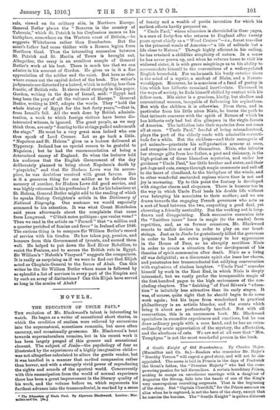NOVELS.
THE EDUCATION OF UNCLE PAUL.• Tun evolution of Mr. Blackwood's talent is interesting to watch. He began as a writer of sensational short stories, in which the crudities of realism were relieved by excursions into the supernatural, sometimes romantic, but more often uncanny, and occasionally gruesome. Mr. Blackwood's bent towards supernaturalism remains, but in his recent work it has been largely purged of this grosser and sensational element. The subject of Jitako—the psychology of fear as illustrated by the experiences of a highly imaginative child— was not altogether calculated to allure the gentle reader, but it was handled in a manner that excited compassion rather than horror, and with a strangely vivid power of reproducing the sights and sounds of the spectral world. Concurrently with this emancipation from the world of normal experience there has been a great improvement in the literary quality of his work, and the volume before us, which represents his furthest advance into the transcendental, is marked by a sense • The Education n Utt62o Paul. By Algernon BkeAmood. London: Mac- millan and Co. [6s.3 of beauty and a wealth of poetic invention for which his earliest efforts hardly prepared us.
" Uncle Paul," whose education is chronicled in these pages, is a man of forty-five who returns to England after twenty years spent chiefly as a " Wood Cruiser "—i.e., forest traveller in the primeval woods of America—" a life of solitude but a life close to Nature." Thc'ugh highly efficient in his calling, be has retained a childlike simplicity of nature. In a sense he has never grown up, and when he returns home to visit his widowed sister, it is with grave misgivings as to his ability to accommodate himself to the conventions of a well-regulated English household. For underneath his burly exterior there is the mind of a mystic, a !student of Blake, and a Nature. worshipper. Moreover, he ia-conscious of a fund of poetry in him which has hitherto remained inarticulate. Unversed in the ways of society, he finds himself chilled by contact with his fellow-men. His sister is a gracious, kindly, but shallow and conventional woman, incapable of fathoming his aspirations. But with the children it is otherwise. From them, and in particular from his little niece Nixie, he learns the path to that intimate converse with the spirit of Nature of which he has hitherto only had but dim glimpses in the virgin forests of America. The initiation into their mysteries does not come all at once. "Uncle Paul," fearful of being misunderstood, plays the part of the elderly uncle with admirable correcti- tude for a while. But the children—and their menagerie of pet animals—penetrate his self-protective armour at once, and recognise him as one of themselves. Nixie, who inherits her strange gifts from her father, a poet and visionary, is the high-priestess of these blameless mysteries, and under her guidance " Uncle Paul," her• little brother• and sister, and their pet dogs and cats, escape through magic casements and sail off to the heart of clondland, to the birthplace of the winds, and to other wonderful enchanted regions where time is not and joy is unceasing. Up to this point the fantasy is developed with singular charm and eloquence. There is humour too in the way in which Uncle Paul leads his double life without ever betraying his associates to their mother; and we are drawn towards the engaging French governess who acts as a sort of bond between the two, suspecting a good deal, yet observing a friendly neutrality. But the working out is long- drawn and disappointing. Each successive excursion into the "limitless inane" loses in magic (to the reader) from repetition, and, as on former occasions, Mr. Blackwood resorts to unfair devices in order to play on our heart- strings. Just as in limbo he gratuitously killed the governess in order to lend an extra poignancy to her appearance in the House of Fear, so he abruptly sacrifices Nixie in order to create a situation for the development of his theories:, of spirit communion after death. Nixie as a living elf was delightful; as a discarnate spirit she loses her charm, and punctuates her transcendental but edifying conversation with explosions of aimless laughter. "Uncle Paul " consoles himself by work in the East End, in which Nixie is deeply interested; but we vastly prefer the irresponsible magic of the first hundred pages to the high seriousness of the con- cluding chapters. The " finishing " of Paul Rivers's " educa- tion" is infinitely less attractive than its early stages. It was, of course, quite right that he should begin to do some work again ; but his lapse from wonderland to practical philanthropy is an artistic blunder, and the events which bring it about are perfunctorily handled. But with all reservations, this is an uncommon book. Mr. Blackwood specialises in recondite experiences and emotions, but he can draw ordinary people with a sure hand, and be has an extra- ordinarily acute appreciation of the mystery, the affectation, and the aloofness of cats. We are not at all sure that " Mrs. Tompkyns " is not the most wonderful person in the book.






































 Previous page
Previous page